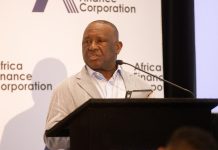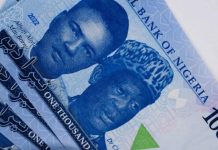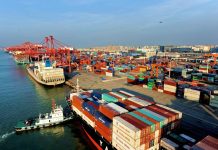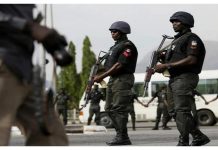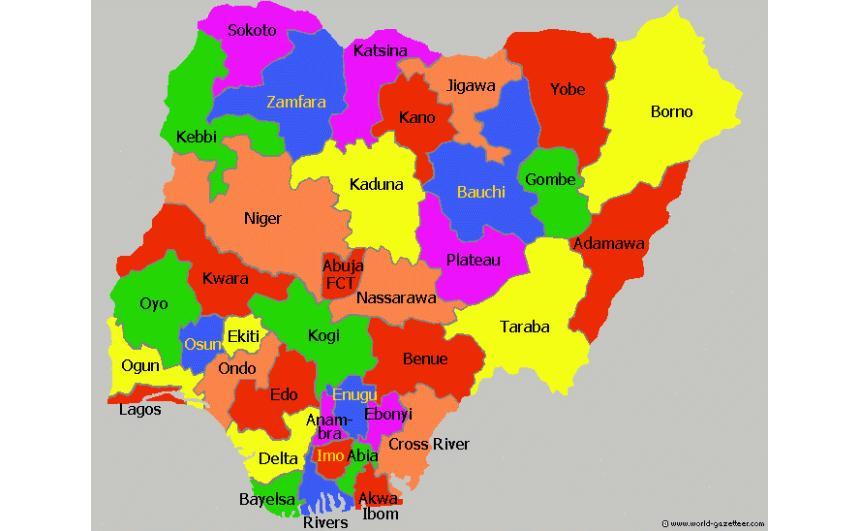
By- Abba Hamisu Sani
Africa-Press – Nigeria. It is a known fact that the Nigerian economy is in bad shape, the majority of the country’s citizens are battling to survive but the irony is that those at the helm of affairs particularly State governors are behaving like all is well with the economy by exhibiting extravagant expenditures.
Recent Statistics indicated that the 36 Nigerian governors spent 1.7 trillion Naira (2,132,995,860.00 dollars) on recurrent expenditures; such as allowances ,foreign trips ,office stationery and aircraft maintenance in nine months of 2023 while the same state governments have to borrow about 46.17 billion Naira( 57,590,888.22 dollars) from three banks to pay salaries between January and June 2023.
The total spending by the states ,including capital expenditure ,amounted to 4.59 trillion Naira (5,813,805,996.00 dollars) in the period under review.The 36 state may not match their 2022 spending of 8.2 trillion Naira( 10,386,320,080.00 dollars) due to reduced revenues and macroeconomic challenges.
Public outcry on the profligate lifestyle of some State governors
As Nigeria languishes in debt laced with the unending economic crisis, it would have been expected that the governors would cut their expenses but from what they exhibited, the reverse has been the case as some of the state chief executives have been leading an extravagant life. The removal of fuel subsidies, increases in taxes, and others are enough for the state governments to wake up to the existing realities of proffering timely solutions to these economic maladies that plunged the states and citizens into difficulties.
Some states in the country are riddled with hopelessness since crude oil no longer serves their expectation as its prices increased drastically. As it is widely known, during the Federation Accounts Allocation Committee meeting, revenues from oil are being divided among the three tiers of government and the FCT. Not quite long ago, money was available like in the era of the oil boom. Then funds allocated to states to address their needs increased as a result of the removal of fuel subsidy.
In this vein, there has been a general belief that state governors will fulfill the righteousness of discarding the culture of profligacy. However, there has been no record of commitment towards doing away with the spending spree, the states have embarked on, even when there are other pressing needs to cater to, which the funds at their disposal can not address.
As a pressing matter, some of these states that are infested with the squandering syndrome owe civil servants salaries and pensions. Also, the states are plagued with bad roads and poor healthcare centers, to mention a few, which deserve ultimate priority.
Some are of the view that instead of the state governor’s embracing financial moderation as a benchmark for cutting the cost of governance, numerous creation of positions for aids, funding of first ladies trivial activities, funds for jet hiring, buying of luxurious vehicles, gargantuan convoys, needless travels and funding of needless projects, these are submissions to wasteful spending.
The States with the highest debt profile
Available data reveals that Lagos State has the highest domestic debt (200 billion Naira). Also, Delta State is topping the list of borrowers from multilateral lenders with 71.45 billion Naira in debt, Akwa-Ibom with 27.0 billion, and Ogun with 22.82 billion Naira.
Lagos State found waiting recently ,in a letter
the 2023 governorship candidate of the Action Democratic Congress in Lagos, Funsho Doherty, noted that that the sum of 440,750,000 naira was awarded to the Office of the Chief of Staff for the procurement of a brand new bullet-proof Lexus LX 600 for use in the pool of the Office of Chief of Staff.Other items flagged are the provision of supply items ; rechargeable fans, rechargeable lights and fridge in the Office of the Deputy Governor which was procured under the Office of the Deputy Governor. The item was awarded to Judkom Enterprises in July 2023 at the sum of 2 billion naira (2,017,840,000 dollars.)
Also flagged was the sum of 7,475,000 naira awarded for the replacement of the liquid fragrance in the Office of Mr Governor, Lagos House, Ikeja..
According to the document, the government reportedly approved 152 million naira for the restoration of water supply at Idunganran Palace, the official residence of the Oba of Lagos. Records allegedly showed that the state would spend 581 million naira to renovate Saint Andrews Anglican Church in the Oke-Popo area of the state. The Office of the Deputy Governor was awarded 30 million for monthly outreach of indigent citizens by the wife of the deputy governor. The office also got another 30 million naira for the empowerment programme. In addition, decorations for the venue of political delegates were reportedly done at the sum of 20,084,550 naira.
“Flying hours’ expenses for ad hoc charter plane by Lagos State Government were awarded for the sum of 400,000,000 Naira,” the document read.
It added that sundry consultancy services received generous allocations ranging from 2 billion naira to 7 billion naira from the state.
However, in a report by The Punch News paper , this was debunked by the Office of the Deputy Governor of Lagos State, which faulted the publication on the website of the Lagos State Public Procurement Agency, attributing the sum of 2,017,840,000 Naira for the provision of items, noting that the correct amount was 2,017,840.Naira.
The position of Abia state
It was noted that within nine months, the state spent 17.61billion Naira on housing/rent allowance, meal subsidy, entertainment allowance, wardrobe allowance, social benefits, pension, gratuity, internet access charge, telephone charges, local and international travels, office stationeries, maintenance services, consulting and professional services, fuel, financial charges, miscellaneous expenses, and others.
Meanwhile, in a press statement on Monday, the state Commissioner for Budget and Planning, Kingsley Anosike, denied the accusation of spending 900 million naira on feeding and welfare, adding that the Abia State Government has so far spent the sum of 397,520,734.84 naira for welfare. Equally, he mentioned that the total amount spent on refreshments and meals is 223,389,889.84 billion naira.
Akwa ’Ibom takes the baton
For Akwa Ibom, in the first two quarters, the state spent 92.54 billion naira on allowances and social contributions, social benefits, travel and transport, utilities such as electricity chargers, Internet access charges, and more, materials and supplies such as office stationery, drugs, laboratory and medical supplies, maintenance, training, and more. So far, the state has spent 10 million on hosting/mobilization of political associations and interest groups, 841.83 million nairas on entertainment at meetings, and more.
Other states on the queue
Adamawa, Anambra, Bayelsa, and Benue are among the states that are enmeshed in the act of profligacy. For Adamawa, the state has so far spent 40.90 billion naira on non-salary expenditure as of the end of third Quarter of 2023. Part of its recurrent expenditure, which includes allowances and social contributions, is 1.29 billion naira on furniture allowance, 1.19 billion in travel and training, domestic and foreign, 214.37 million on office stationery and consumables, and 413.32 million on refreshments and meals.
Anambra State’s non-salary expenditure was 15.17 billion naira as of the end of 2nd quarter of 2023, while that of Bauchi State was 70.25 billion naira. By the end of the second quarter of 2023, Bayelsa had spent 58.26 billion on non-salary recurrent expenditure. These expenses include 2.18 billion naira on training and travel, 1.81billion naira on welfare packages, 78.60 million on burial logistics, 1.48 billion on town hall meetings expenses, and 48.20 million nair on praise night/thanksgiving expenses, 17.70 million on marriage ceremony support, and more.
Benue’s non-salary expenditure was 34.44 billion. It spent 387.55 million on special day celebrations, 434.17 million on welfare packages, 7.06 billion on security votes, and 1.23 billion on materials and supplies such as office stationery, books, and more.
Borno State spent 32.63 billion Naira as of the end of the third Quarter as non-salary expenditure, in 2023, Cross Rivers was 43.71 billion, Delta was 152.15 billion, Ebonyi was 30.91 billion naira, Edo was 41.11 billion Naira. As of the end of the second quarter of 2023, Ekiti’s non-salary spend was 31.33 billion naira. Part of this expense includes 2.74 billion on local and international travel and transport, and 1.97 billion on miscellaneous such welfare packages, refreshments,
honorarium and sitting allowances, and more. Enugu State’s non-salary spending as of the end of the third Quarter of 2023 amounted to 33.36 billion naira while Gombe State’s spending was 24.73 billion naira (for the first and second Quarters).
That of Imo State was 58.21 billion naira where 1.21 billion naira was spent on refreshments and meals, 866.81 million on welfare packages, 3.26bn on allowances, and more. Jigawa State’s non-salary spending was N49.64 billion which included allowances of 22.07 billion nairas, 1.18 billion nairas on transport and traveling, 1.83 billion nairas on materials and supplies including drugs, vaccines, medical supplies, stationeries, and more.
Total non-salary spending by the Kaduna State Government was 27.87 billion naira as of the end of the third Quarter For Kano State, it was N17.79 billion (for the first and second quarters), Katsina was 40.49 billion naira Kebbi was 24.51billion naira, Kwara was 41.19 billion naira, Kogi was 58.02 billion naira
Reactions on the situation and the expenditures
Enefaa Georgwill is the chairman of the South-South United Action for Democracy ,and the Rivers State Civil Society Organisations.He said that the misappropriation of resources by state governors was uncalled for.
“For us, as a community service organization, we frown on the misappropriation of our resources by state governors specifically in this biting economy. However, the government has been telling us to tighten our stomachs and our jobs in the reality of the economic downturn. We want to call on the people to punish them politically in the next election so that it can serve as a deterrent to others. Equally, we want to call on the people to start challenging and questioning elected officials.
The idea of waiting for the election cycle to take action is more like postponing critical action that would have been taken to save the situation.
“In Abia State, the government earmarked a few million naira for education whereas the government spent almost a billion naira. People have called on the government to reverse that money and change the policy to budget more money for education, agriculture, and other pro-people policies. For Lagos State, in a very tight economic situation, people are jumping into the lagoon because of the harsh economy. People find it hard to survive the surge in the price of transportation in Lagos. The governor has been earmarking money on all manners of frivolous spending. There will be mass action and litigation from human rights lawyers to checkmate these persons. It is quite pathetic.” The activist stated.
Socio-Economic Rights and Accountability Project (SERAP) is one the leading Non-governmental organizations in Nigeria.The organization urged the World Bank to suspend granting loans to Nigeria state governments
It also called on the Bank to promptly, transparently and effectively conduct investigation into spending of loans and other facilities by the country’s 36 state governors and to suspend any loans and funding if there is relevant admissible evidence of mismanagement or diversion of public funds by any of the states.
“We urged the Bank to suspend further applications for loans and any other funding to the 36 states until these states are able to satisfactorily explain details of spending of loans and other facilities obtained from the Bank and its partners.” SERAP said
Many of the country’s 36 states are allegedly mismanaging public funds which may include loans obtained from the Bank and its partners, and allocations from the Federal Government, which may also include loans obtained from the Bank.
This was contained in a press releases recently issued by the civil society signed by its deputy director Kolawole Oluwadare, the organization said the World Bank and its partners cannot continue to give loans and other funding to these states where there are credible allegations of mismanagement or diversion of public funds.
, “We are concerned that there is a significant risk of mismanagement or diversion of funds linked to the Bank’s investments in many of the country’s states. It is neither appropriate nor responsible lending to give loans to these states only for the loans to be misspent.” It added.
The letter read in part: “The World Bank’s lending, and support for these states may create the impression of complicity in the allegations of mismanagement or diversion of public funds by the states which may include loans from the Bank and its partners, and federal allocations.
“We would consider the option of pursuing legal action should the World Bank fail or fail to implement the recommendations contained in this letter, and we may join the country’s 36 states in any such suit.
“According to Nigeria’s Debt Management Office, total public debt portfolio for the country’s 36 states and the Federal Capital Territory is 9.17 trillion Naira. The Federal Government’s total public debt portfolio is 78.2 trillion.Naira” The Non-governmental organization stated.
SERAP also urges you(World Bank). to demand expressed commitment from Nigeria’s 36 governors to address credible allegations of mismanagement or diversion of public funds in their states and provide guarantees that loans and funding from the Bank and its partners would not be used to fund the luxurious lifestyles of politicians..
It also urges the Bank to send independent monitors to the 36 states to monitor the spending of the loans and other funding obtained from the Bank and its partners to remove the risks of mismanagement or diversion of public funds by these states..
“The World Bank currently has a portfolio of about $8.5 billion spread across the country. The Bank has also approved several loans and other funding facilities to the country’s 36 states including the recent $750 million credit line meant to allow the states to carry out reforms to attract investment and create jobs.
“The accounts of Nigeria’s 36 states are generally not open to public scrutiny as many of them continue to refuse freedom of information requests seeking transparency and accountability in the spending of public funds.
“The World Bank and its partners need to make clear to Nigeria’s state governors that it would not tolerate any mismanagement or diversion of public funds by immediately suspending any pending loans and other funding to them until the allegations of mismanagement or diversion of public funds are investigated.”
The Bank has a legal responsibility to ensure that suspected perpetrators are brought to justice, and that any mismanaged or diverted public funds are returned to the treasuries of the states.”
The World Bank has the legal obligations to observe and promote compliance with the Nigerian Constitution 1999 [as amended] and domestic laws including the Fiscal Responsibility Act of 2007.”
Nigeria’s total public debt stock, including external and domestic debts, increased to N46.25 trillion or $103.11 billion in the fourth quarter of 2022.”
Many states reportedly owe civil servants’ salaries and pensions. Several states are borrowing to pay salaries. Millions of Nigerians resident in these states continue to be denied access to basic public goods and services such as quality education and healthcare.”
Several state governors are also reportedly spending public funds which may include funding obtained from the Bank and its partners and allocations from the Federal Government to fund unnecessary travels, buy exotic and bulletproof cars and generally fund the lavish lifestyles of politicians.
The country’s 36 states have reportedly spent N1.71tn on recurrent expenditures, including allowances, foreign trips, office stationery, and aircraft maintenance in the first nine months of 2023.”SERAP added
The position of the law on loans and how to depend on it
Section 41 of the Fiscal Responsibility Act provides that :Government at all tiers shall only borrow for capital expenditure and human development.
“Section 44 of the Fiscal Responsibility Act provides: ‘Any Government in the Federation or its agencies and corporations desirous of borrowing shall, specify the purpose for which the borrowing is intended and present a cost-benefit analysis, detailing the economic and social benefits of the purpose to which the intended borrowing is to be applied.’”
“Under Section 45, ‘All banks and financial institutions shall request and obtain proof of compliance with the provisions of this Part before lending to any Government in the Federation. 2) Lending by banks and financial institutions in contravention of this Part shall be unlawful.’”
SERAP says World Bank and its partners have obligations under international anti corruption and human rights law, including a responsibility to promote transparency and accountability in the management of public funds, prevent mismanagement or diversion of public funds, and redress any abuse of public trust that they may have contributed to.
“As a UN specialized agency, the World Bank also has an obligation to promote transparency and accountability in the management of public resources and effective implementation of the UN Convention against Corruption to which Nigeria is a state party.”
The World Bank’s board of executive directors also has an obligation to ensure that the policies and decisions of the Bank are consistent with their own statutes and governments’ transparency and accountability obligations.” SERAP reiterated
However there is need for individual Nigerians and civil society organizations to intensify efforts in tracking the expenses of the state governor’s and ensure that any governor found wanting should not be re-elected and should be exposed by the civil societies even when in Government.
Looking at money spent as recurrent expenditures by the 36 state governors amounts to 2,132,995,860.00 dollars while borrowing 57,590,888.22 dollars to pay salaries which is unfortunate.
It’s also important for the Federal government to ensure strict compliance with the fiscal responsibility act which specified terms and conditions of collecting loans and how to spend it.
For More News And Analysis About Nigeria Follow Africa-Press



